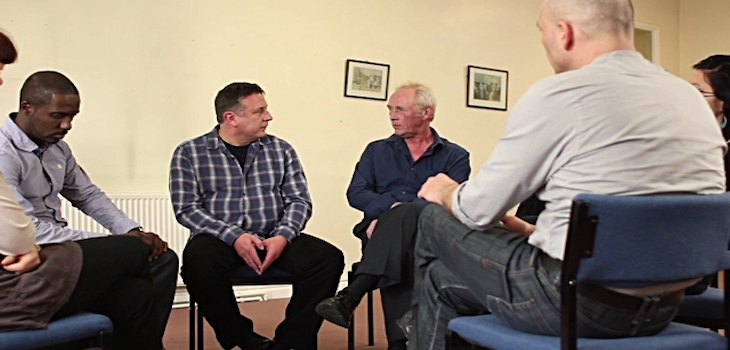If you haven’t heard John Gottman, PhD speak, you should. Not only did he succinctly and creatively consolidate the components of his famous method of couples therapy and the research basis from which it resides but he is something else . . he is funny and meticulously engaging.
Myself and over 850 others in a sold-out performance had the great honor to hear him speak last night at the Boca Raton Synagogue, sponsored in part by the Jewish Federation.
After a few relevant stories of how he came to be the couple’s therapy expert, he escorted us step by step through the framework that he believes to be the elixir for a good healthy couple-ship.
If you are not familiar with any of his mainstream self-help books on couple’s therapy and how to make marriage work, or are a student of his trainings, then you may have found it interesting to hear the basic tenets behind his approach, The Gottman Method. As an MIT graduate in mathematics, it seems fitting that research of some sort might be his path; and so began the Love Lab where he and his staff have had the opportunity of observing and monitoring couples in various situations.
The 4 Horseman of the Apocalypse-The Road to Demise and Couples Therapy
From the Love Lab, Gottman’s famous couple’s lab, emanated his famous concept of the “4 horseman of the apocalypse”, aka accurate predictors of a relationship’s future. These include criticism, stonewalling, defensiveness and, probably the worst, contempt. Here is a succinct synopsis of these wreckable dwellers. Not good words in the world or relationship or couples therapy.
Criticism belongs on the ‘walk of shame’; that it, when we criticize, even constructively when uninvited, it can be and often is received as a personal attack or denigration. Why? Because often we designate a part of one’s personality and not necessarily a behavior. We learn in parenting 101-praise/consequence the behavior and not the child and that the child is good regardless. We can apply the same to a marital relationship.
Stonewalling is akin to infant that refuses to take in any food when they are learning to eat; their mouth is shut and food is not able to enter. This is when someone turns away from an interaction either because they don’t care, are angry or because they are overstimulated and unable to process their present experience.
Defensiveness is essentially providing reasons, excuses or being a victim when someone attacks or says something critical. Defensiveness is rarely useful; unless someone wants an explanation don’t respond. Listen. I always say. .” listen to listen, don’t listen to respond”.
Contempt is probably the most catastrophic of the lot; it propels a couple right down the rabbit hole to annihilation. Don’t do it. Contempt can show up in many ways, a denigrating expression, eye roll, shame statement, dismissiveness; but overall it is dismissive and breaks any connection between two people.
Building a Sound Relationship House
According to John and his wife, Julie Gottman, PhD, couples need to achieve and work through the Sound Relationship House. This is where the couple resides just after the first ‘romantic’ or completely narcissistic stage where there is a uni-focus on each other, both in and out of the bedroom. Comprised of several elements, the Sound Relationship House is in some ways akin to Maslow’s hierarchy where the start is at the bottom and couples need to work their way to the top.
Building Love Maps is entering each other’s world. Its knowing who your partner is, their meaningful life’s moments and what defines them. It is this that begins the foundation. There is even a questionnaire. . who is your partner’s closest friend? Enemy?
Shared Fondness and Admiration is just that; acknowledging what you admire and appreciate about each other; in this way attention stays and connection is the antidote to contempt. There is also a questionnaire developed to test your level. Regardless of how long you have been together, for example, always remind your partner how much you appreciate them and how much they mean to you.
One of my favorites, Turn Towards instead of Away is just that; we need to face our partner during connection and when they present those bids for connection. We need to listen, validate, acknowledge with interest and not dismissiveness, the latter of which can certainly make someone feel less important in the relationship. Know that these bids show up in several ways, like a reach for approval, a shared story and so on.
Having a Positive Perspective involves having PSO or “Positive Sentiment override”, a positive gestalt of your partner that you carry with you even when they are not physically present. That is, you see them, overall, through a positive lens and not a negative or derogatory view. This is critical especially since negativity breeds contempt. This shows up in many ways and in other aspects of the House.
Managing Conflict– This is a big one; in fact, there are couples therapy models that are designed specifically for this. Gottman’s 6 skills include:
- Soft Startup
- Acceptance of Influence
- Effective Repair
- De-escalation
- Psychological Soothing of partner and self
- Compromise
Make Life Dreams Come True involves first identifying and sharing those dreams. They can be individual dreams, like studying with a shaman in the forests of Peru, or a joint dream, like building a hotel together. The key is to honor each other’s dreams and hope that the timetable works for the relationship.
Create Shared Meaning. At the top of the house, kind of like Maslow’s self-actualization in his needs grouping, is the making meaning level. Here is where Gottman talks about rituals, roles, goals and symbols. Rituals are indispensable. Rituals create meaning over time. They are imperative not just for couples but for families and groups of any kind because they provide the opportunity to stay connect to each other through a shared repetitive experience. Holidays are such an example, albeit a generic one.
Gottman also made mention of relevant researchers and writers who have impacted his work like the research done at his Alma Mater, the University of Wisconsin by Harry (Israel) Harlow on the impact of attachment in the rhesus monkey, Viktor Frankel on making meaning and on why people turn away referencing Shirley Glass’s Not Just Friends, a piece on infidelity.
It was enlightening to hear his take on couples therapy in Boca Raton. Whether you are or are not a student of his, I encourage you to find an opportunity to hear him in the flesh.
You can read more about his approach here.
You can find relationship help and couples therapy here.
.






